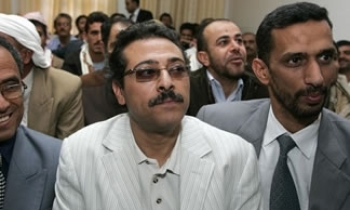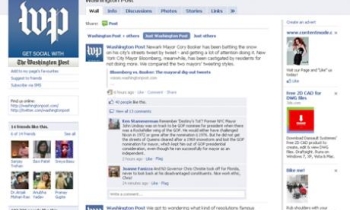Jane Cox MacElree, an influential member of the family that has controlled The Wall Street Journal for more than a century, forced back tears as she invoked the memory of a murdered Journal reporter.
At a family gathering Monday, the 77-year-old Ms. MacElree cited Daniel Pearl's death at the hands of kidnappers in 2002 in voicing her opposition to a bid by Rupert Murdoch's News Corp. to buy Dow Jones & Co., publisher of the Journal, according to participants.
"He put his life on the line for the paper," Ms. MacElree said, stopping to regain her composure, according to participants.
Ms. MacElree -- whose late mother, Jessie Bancroft Cox, was the matriarch of the Bancroft family -- shares voting control over stock representing 15% of Dow Jones's total votes. Her seven children are divided over whether to sell to the media mogul. But she argued that the deal could compromise the Journal's independence. Some family members applauded.
The scene highlights the difficulty of the decision now faced by the Bancroft family, which has held a controlling interest in Dow Jones since 1902. At the meeting, at a Hilton hotel in Boston, 33 family members were briefed in person or by phone on the details of a $5 billion News Corp. offer that the Dow Jones board approved last week. Family advisers have called on the Bancrofts to make a decision by early next week, although some family members are bristling at the notion of a deadline.
Interviews with more than a dozen family members, outside advisers, lawyers and others involved in the process suggest that the outcome remains too close to call. What has seemed to many analysts like a logical move -- accepting a $60-a-share bid for a company whose shares previously had been trading in the mid-30s -- is still in question amid the deep emotions the bid has stirred. Participants said more doubts about a News Corp. deal were apparent at the end of the six-hour session than at the beginning.
However, it will still be difficult to block the transaction, given that it would take only a few players to deliver a deal to Mr. Murdoch.
In recent days, investors have become less confident that a deal will occur. In 4 p.m. trading on the New York Stock Exchange, Dow Jones shares stood at $52.67, down $2.02, or 3.7%. That's well below a recent high of $61.76 in early June.
The company's advisers reckon that family-owned shares representing 30% of Dow Jones's overall voting power must be voted in favor of the News Corp. transaction for it to go through. The family controls 64% of Dow Jones's voting power. The calculation assumes that nonfamily shareholders would overwhelmingly back the deal.
The Bancrofts' predicament has become a wrenching test of loyalties, including parents' choices among children and the upholding of tradition against obligation to future generations. Now the family could be splintered by the company that once brought it together.
Of the family's three main branches, the Cox branch -- which includes Ms. MacElree -- is perhaps the most divided. Two of Ms. MacElree's sons favor a sale to Mr. Murdoch, while the third is leaning against, say people familiar with their thinking. Her four daughters mostly are aligned with their mother against the deal, according to people who have talked to them.
One son favoring a deal, Thomas Hill, said Monday that the family has done a poor job overseeing the company and it would be better off as part of a bigger company, participants say. Another Murdoch supporter, Crawford Hill -- phoning in to the meeting from a vacation in Spain -- called it "ironic" that "all these years we haven't done enough to question management," participants say. He added: "It seems like bad timing to start now."
Ms. MacElree's biggest support on Monday came from her daughter, Leslie Hill, a Dow Jones director and former airline pilot.
Ms. Hill, 54, walked to the front of the room and stopped. "I have two speeches I could give," she said, according to participants, "but I can't give either one of them."
Instead, she waved a quarter-inch-thick manila envelope filled with letters from Journal reporters and editors who protested a deal with News Corp. She said it was their voices that mattered. In a halting speech, she was on the verge of tears as she talked about the reporters' dedication to their jobs, and told family members they owed it to the Journal's rank and file not to sell the paper, according to participants.
Some family members believe Ms. Hill's opposition helped shape the decision of her mother, Ms. MacElree. Ms. MacElree travels routinely to Ms. Hill's house to take care of Ms. Hill's children. And Ms. Hill has helped Ms. MacElree with financial aspects of her farm in Pennsylvania.
Ms. Hill couldn't be reached for comment.
Ms. Hill initially was open to exploring a deal with Mr. Murdoch. But that changed when she and other family directors sat down with him in a face-to-face meeting on June 4. She asked Mr. Murdoch how he would handle the Journal's coverage of China, given his reputation for avoiding negative coverage of the Chinese government. She told several people afterwards that she didn't trust his answer, these people say.
Mr. Murdoch said in an interview yesterday he had heard that Ms. Hill didn't think he answered some of her questions. He said he had subsequently sent her several messages through intermediaries offering to talk further, but had not received a response.
On Monday, Ms. Hill concluded by saying she believed the family should take the "leap of faith" that something good will emerge if the family turns down Mr. Murdoch's offer.
Ms. MacElree's decision is particularly knotty because much of her voting control comes not from direct ownership of Dow Jones shares but from her role as trustee for trusts in which her cousins -- Martha Robes, Jean Stevenson and Elizabeth Steele -- are the beneficiaries. More than 100 trusts hold the Bancrofts' Dow Jones stake.
In a twist, those three sisters -- once viewed among family members as the most fervent believers in maintaining Dow Jones's independence -- now are among the most committed supporters of a deal with Mr. Murdoch.
Indeed, Ms. MacElree was countered on Monday by Ms. Steele, a Dow Jones board member, who delivered a thorough review of the pros and cons of a News Corp. transaction. While she said she wasn't overly excited by a pairing with Mr. Murdoch, Ms. Steele concluded that the company would be better served in partnership with a broader media organization in an increasingly competitive marketplace, participants say.
Given the environment, Ms. Steele said, it "will be irresponsible to walk away from this deal," according to participants. Ms. Steele declined to comment.
Earlier in the meeting, a presentation by bankers from family adviser Merrill Lynch & Co. concluded that there was no other way to get the company's stock price to $60 per share in the short to medium term, participants say. The bankers stopped short of giving advice on whether to sell the company.
Among the key swing votes is the family's major trustee, Michael Elefante, a partner at Hemenway & Barnes. The Boston law firm has overseen the Bancroft trusts for decades. His influence is enormous because trustees have leeway to vote in what they believe is the best interests of the beneficiaries. Some of the trusts require a unanimous vote; others require a majority.
The trustees' decisions could be legally perilous. Beneficiaries in the family who don't agree with how the trusts are voted could sue the trustees.
Mr. Elefante spoke first. He stood at a podium in the front of a cramped and windowless 25-by-40-foot conference room to rows of family members seated on upholstered gold-patterned chairs. Though he has taken a neutral stance publicly, he delivered what some family members perceived as a defense of a deal with News Corp., according to participants.
Mr. Elefante, a Dow Jones director, previously has told other board members he believes family shares representing roughly 30% of Dow Jones's overall voting power are in favor of a Murdoch deal. That would likely be enough to trigger a sale. It isn't clear how he is tallying those votes.
Mr. Elefante plans to begin canvassing the family and trustees later this week by phone. If they signal they favor the deal, he will then ask them to sign a document committing their support.
If the family votes against the deal, Dow Jones's stock prices would probably fall sharply. But it may not go as far as $36, the level at which it was trading before news of the offer became public, if investors believe the company is still in play. Continued deterioration in advertising means there's no guarantee another buyer would come forward. Last week, Dow Jones reported that ad revenue at the U.S. print edition of The Wall Street Journal fell 6.8% in the second quarter.
If the deal falls through, Dow Jones might be more aggressive in cutting costs and looking for acquisitions or joint ventures, one person familiar with the situation said. However, Dow Jones director Lewis B. Campbell, who is chairman of the board's governance committee and chief executive of Textron Inc., told the Bancroft family meeting on Monday that Dow Jones as it stands doesn't have sufficient capital to compete for acquisitions. He noted that the company lost out in the auction of Web domain name business.com.
At the meeting, among those arguing against the deal was another important trustee, Christopher Bancroft, also a Dow Jones director. Mr. Bancroft, 55, said he saw no need to sell the company. He said Dow Jones was worth more than $60 a share. Pacing as he spoke, he told the group that "we're not broken," participants say. He said selling to Mr. Murdoch was a bad deal, and the family was about to "sell the milk cow for beef."
Mr. Bancroft consistently has opposed a Murdoch bid. At the meeting, he said: "I'm going to vote no for the family shares I control, and I'm going to take the advice of my legal counsel for my votes as a trustee," according to participants.
Some family members suggested this was a hint that Mr. Bancroft could split his votes, making a symbolic protest while ultimately acquiescing to the Murdoch deal. But a person familiar with his thinking said he doesn't have any intention of voting yes to the current Murdoch proposal, even as a trustee. His comment was intended to emphasize that he understood his different roles, and that his vote has been vetted by legal counsel, this person said.
Mr. Bancroft conceded to the group that he enjoyed News Corp.'s media outlets -- which include Fox News Channel -- as a consumer, participants said. But he said he believed a more suitable owner for Dow Jones would jump in if the group turned the deal down. Mr. Bancroft and Ms. Hill in recent weeks have tried separately to drum up alternatives to a deal with News Corp.
Mr. Bancroft -- who emerged from the meeting shortly before 7 p.m. wearing a baseball cap embroidered with a picture of fishing lure and the line "Bite Me" -- said it was still unclear whether the family would support the bid.
Mr. Bancroft also faces internecine dilemmas. If he votes his 15% voting power against a deal, as expected, it would run counter to the wishes of his brother, Hugh Bancroft III, who favors a sale to Mr. Murdoch. (Mr. Bancroft's sister, Kathryn Bancroft Kavadas, is said by other family members to oppose a deal.) Ms. Kavadas couldn't be reached for comment.
In William Cox Jr.'s branch of the family, the situation is in flux. Mr. Cox spoke in opposition to the sale Monday, but late yesterday he appeared to waver, saying: "I'm leaning toward a sale. I'm not overly fond of Rupert but there's no one else who's going to do anything with it. I doubt we'd ever get anything else like this again."
Soon after, following a conversation with a family member who opposes the deal, Mr. Cox told a reporter: "I want to eradicate that." He explained: "I could have said there won't be a higher bid, but I didn't say I was 'leaning toward a sale.'"
Mr. Cox's son, William Cox III, was a vocal critic of Dow Jones management in 1997 and now favors a sale to Mr. Murdoch.
Another potential swing vote is the stake controlled by Denver law firm Holme Roberts & Owen. The firm, which manages trusts that control about 9.1% of the overall vote, is generally in favor of the deal, according to people familiar with the matter, but wants more money. On Monday, Lynn Hendrix, the firm's lead trustee, argued in a presentation that Mr. Murdoch should pay $66 to $72 a share, at least to holders of supervoting class B shares, according to these people.
"We are worth more and we should be able to get more," Mr. Hendrix told the group, according to a participant. He added that he had been talking to M. Peter McPherson, Dow Jones's chairman, about that view. Mr. McPherson interrupted him to say that the board concluded it wouldn't recommend the deal to shareholders unless all shareholders get the same price, according to the person who was there.
The trusts managed by the Denver firm were set up by Hugh Bancroft Jr., father of Christopher Bancroft and Hugh Bancroft III. They benefit those two sons as well as two daughters.
Unlike the trusts managed by Hemenway & Barnes, which hold most of the Bancrofts shares, the Holme Roberts & Owen trusts allow the beneficiaries limited influence, these people say.
Mr. Murdoch has said he doesn't intend to raise his price, potentially setting up a game of chicken as the Bancrofts enter the final days of deliberation. One person close to News Corp. discussed the outcome of a failed deal, wondering whether the Denver trustees would prefer to hold a $30 stock or a $60 one.
A spokesman for News Corp. said the company will continue to be patient over the next few days.
Much of the discussion Monday centered on an agreement between Mr. Murdoch and Dow Jones seeking to assure the independence of the Journal. The pact was designed to preserve a measure of autonomy for the newspaper and other Dow Jones publications by shielding top editors from corporate meddling.
Several elder members of the Bancroft family were skeptical about whether the editorial board would adequately protect the Journal's independence. Following a presentation on the issue by Michael Puzo, another partner at Hemenway & Barnes, William Cox Jr. asked sharply, according to participants: "How can you stop Rupert from interfering?"
Ms. MacElree chimed in, participants say: "Why would you sell a company to an owner where you need this kind of protection?"
Mr. Puzo replied that senior Journal editors felt the structure had "teeth," those who were there say. But he also stressed that there were limits to what the family could demand and that while he felt the agreement was solid, it wasn't bulletproof.
By 6 p.m. Monday, after four hours of discussion, family members were so hungry that they made do with a tray of stale danishes. Family members were free to get up and leave the room, but on bathroom breaks they were accompanied by security guards, ostensibly to shield them from reporters. The meeting broke up about 8 p.m.
In her presentation, Ms. MacElree summed up the dilemma the family faced. She told a story of a man she had met at a Harvard Business School course in the 1990s for family-run businesses. The man said he felt the weight of his grandfather on one shoulder and the weight of his great-grandfather on the other.
She said: "I feel the same weight of the past on me now."
Write to Sarah Ellison at sarah.ellison@wsj.com, Susan Pulliam at susan.pulliam@wsj.com, Matthew Karnitschnig at matthew.karnitschnig@wsj.com, Dennis K. Berman at dennis.berman@wsj.com and Susan Warren at susan.warren@wsj.com









